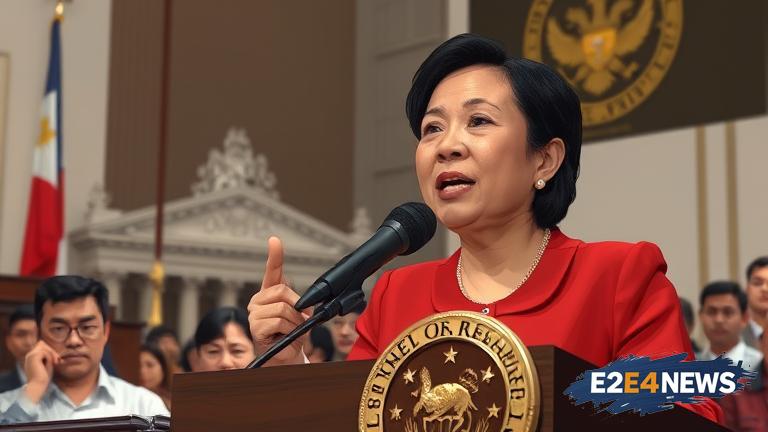The Philippine House of Representatives has taken a significant step by filing a motion to appeal the Supreme Court’s decision on the impeachment of Vice President Sara Duterte. This move comes after the Supreme Court ruled that the impeachment proceedings against Duterte were unconstitutional. The House of Representatives is arguing that the Supreme Court overstepped its bounds and that the impeachment process is a constitutional right of the legislative branch. The impeachment complaint against Duterte was filed due to allegations of corruption and abuse of power. The complaint cited several instances where Duterte allegedly used her position for personal gain and to favor certain individuals and companies. The House of Representatives is contending that the Supreme Court’s decision undermines the principles of checks and balances in the Philippine government. The lawmakers argue that the impeachment process is an essential tool for ensuring accountability and transparency in government. By appealing the Supreme Court’s decision, the House of Representatives is seeking to assert its authority and protect its constitutional prerogatives. The case has significant implications for the Philippine democratic system and the balance of power between the different branches of government. The Supreme Court’s decision has been met with criticism from various sectors, with many arguing that it sets a dangerous precedent for the judiciary’s interference in legislative affairs. The impeachment process against Duterte has been a highly contentious issue, with many of her supporters arguing that it is a politically motivated attack. However, her critics argue that the allegations against her are serious and warrant a thorough investigation. The House of Representatives’ decision to appeal the Supreme Court’s ruling is seen as a bold move to challenge the court’s authority and protect the legislative branch’s powers. The case is expected to have far-reaching consequences for the Philippine political landscape and the future of the country’s democratic institutions. The international community is also watching the developments closely, as the case has implications for the rule of law and the separation of powers in the Philippines. The Philippine government has been under scrutiny for its human rights record and its commitment to democratic principles. The impeachment case against Duterte is seen as a test of the country’s democratic institutions and its ability to hold public officials accountable. The House of Representatives’ appeal is a significant development in the case, and it remains to be seen how the Supreme Court will respond. The case is likely to be closely watched by the public and the international community, as it has significant implications for the future of Philippine democracy. The Philippine House of Representatives is composed of elected representatives from different districts across the country. The lawmakers are elected by the people and are responsible for representing their constituents’ interests. The House of Representatives has the power to impeach public officials, including the president and vice president. The impeachment process is a complex and contentious issue, and the Supreme Court’s decision has added a new layer of complexity to the case. The House of Representatives’ appeal is a significant step towards resolving the issue and clarifying the role of the judiciary in impeachment proceedings. The case has sparked a national debate about the role of the judiciary in Philippine politics and the limits of its power. The impeachment case against Duterte has also highlighted the need for greater transparency and accountability in government. The Philippine government has been criticized for its lack of transparency and accountability, and the impeachment case is seen as an opportunity to address these issues. The House of Representatives’ appeal is a significant development in the case, and it remains to be seen how the Supreme Court will respond. The case is likely to have significant implications for the future of Philippine democracy and the balance of power between the different branches of government.





